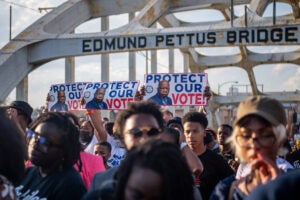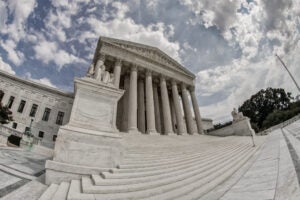People
Nicholas Stephanopoulos
-
It’s Election Day 2022 in Sheboygan, and voters in this majority blue city once again have no chance of electing a Democrat to legislative office.
-
Our Opinion: Democracy on trial
December 5, 2022
Oral arguments begin Wednesday in an important case that our state’s Republican-led legislature has dragged all the way to the U.S. Supreme Court. We’ll be…
-
You thought the Supreme Court’s last term was bad? Brace yourself.
October 18, 2022
The cataclysmic Supreme Court term that included the unprecedented leak of a draft opinion and the end of constitutional protection for abortion would, in the…
-
It was the final round of questions and Ketanji Brown Jackson, the newest member of the US supreme court, had one final thing to ask.
-
Ketanji Brown Jackson Gives The Supreme Court A History Lesson
October 5, 2022
Justice Ketanji Brown Jackson gave a forceful performance in defense of the race-conscious history of the 14th Amendment and the Voting Rights Act on Tuesday,…
-
The Supreme Court May Well Legalize Election Theft This Term
October 4, 2022
Donald Trump’s installation of three radical right-wingers on the Supreme Court is already yielding frightening victories for religious zealots and racists. Last term, the court’s…
-
In March 1965, Martin Luther King, Jr. led a civil rights march in support of voting rights in the Jim Crow South across the Edmund…
-
You thought the Supreme Court’s last term was bad? Brace yourself.
September 30, 2022
The cataclysmic Supreme Court term that included the unprecedented leak of a draft opinion and the end of constitutional protection for abortion would, in the…
-
Top State Judges Make a Rare Plea in a Momentous Supreme Court Election Case
September 26, 2022
“It’s the biggest federalism issue in a long time,” Chief Justice Nathan L. Hecht of the Texas Supreme Court said on the phone the other…
-
Supreme Court preview: Merrill v. Milligan
September 23, 2022
Harvard Law Professor Nicholas Stephanopoulos explains how the Alabama redistricting case could affect the future of the Voting Rights Act.
-
The Partisan Implications of the ISL Theory
August 30, 2022
An article by Nicholas Stephanopoulos: Observers of the debate over the independent state legislature (ISL) theory would be forgiven for assuming that its adoption would…
-
Harvard Law School experts weigh in on the Supreme Court’s final decisions.
-
New York Democrats made a last-ditch appeal to the state’s highest court on Tuesday to overturn a pair of lower-court rulings and salvage newly drawn congressional districts that overwhelmingly favor their party. In oral arguments before the New York State Court of Appeals, lawyers for the governor and top legislative leaders said that Republicans challenging the lines had fallen short of proving that the state’s new congressional map violated a state ban on gerrymandering. ... Nicholas Stephanopoulos, a Harvard law professor who studies redistricting, said New York’s map was not “remotely” as skewed as maps adopted by Republicans in Florida or Democrats in Illinois. And he cautioned that striking down New York’s maps while allowing other Republican-drawn gerrymanders to stand across the country would only further bias the national map toward one party. Still, Mr. Stephanopoulos said the litigation in New York and other states this year offered some reason for optimism in a decades-long fight by public interest groups to curb the influence of gerrymandering. “The fact that both sides are now willing to bring partisan gerrymandering claims, and state courts have struck down both Republican and Democratic maps, I think that is encouraging in terms of sweeping national reform in the future,” he said.
-
Civil rights defenders on Thursday welcomed a ruling by a federal judge who struck down parts of a Florida voter suppression law, calling racism “a motivating factor” in the GOP-backed legislation’s passage. In a 288-page ruling, U.S. District Judge Mark Walker blocked provisions of Florida’s Senate Bill 90, a massive attack on voting rights signed by Republican Gov. Ron DeSantis in 2020. The law empowers partisan poll watchers, imposes strict voter ID requirements, criminalizes so-called “ballot harvesting,” limits ballot drop boxes, and bans advocacy groups from handing out food or water to voters waiting in long lines. ... “We’ve seen other district courts do aggressive things in election law cases, and we’ve seen a lot of those decisions get reversed by appellate courts or the Supreme Court,” Nicholas Stephanopoulos, a Harvard Law School professor and election law expert, told The New York Times.” I wouldn’t be shocked if this litigation falls into that pattern.”
-
A federal judge in Florida ruled on Thursday that sections of the state’s year-old election law were unconstitutional and racially motivated, and barred the state from making similar changes to its laws in the next decade without the approval of the federal government. The sharply worded 288-page order, issued by Judge Mark E. Walker of the Federal District Court in Tallahassee, was the first time a federal court had struck down major elements of the wave of voting laws enacted by Republicans since the 2020 election. Finding a pattern of racial bias, Walker in his ruling relied on a little-used legal provision to impose unusual federal restrictions on how a state legislates. ... “From a realistic perspective, it’s unlikely that the 11th Circuit or the Supreme Court would agree with the district court that there was racially discriminatory intent in Florida,” said Nicholas Stephanopoulos, a Harvard Law School professor and an expert on election law. “There’s a lurking fear that the same court that decided Shelby County might decide that bail-in is unconstitutional.”
-
Biden’s power to act on his own to safeguard voting rights is limited
February 14, 2022
As Republicans impose new restrictions on ballot access in multiple states, President Biden has no easy options for safeguarding voting rights despite rising pressure from frustrated activists. Unlike on other issues such as immigration or environmental protection, the White House has little leverage without congressional action as the November elections creep up. “If there were some sort of easily available presidential power on this, others would have done it,” said Nicholas Stephanopoulos, a Harvard Law School professor who researches election law. “There is no significant unilateral authority here.”
-
What the Supreme Court’s decision on Alabama’s maps could mean for the Voting Rights Act
February 14, 2022
A contentious decision from the US Supreme Court in a Voting Rights Act case from Alabama this week previewed what could be a momentous legal battle over the 1965 law, which over the past several years has been repeatedly whittled down by the conservative justices. ... "Alabama's proposal would turn the VRA into a race-blind statute that only looks into what this hypothetical race-blind process would produce," said Nicholas Stephanopoulos, a Harvard Law professor who specializes in election law. "And so the consequence would be just substantially less minority representation in America."
-
Alabama ruling signals new threat to voting rights law
February 11, 2022
When three federal judges last month blocked Alabama’s new Republican-backed map of US congressional districts as likely discriminatory against Black voters, they said they were applying “settled law” and that the outcome was not even close. An increasingly assertive conservative-majority US Supreme Court disagreed. The justices froze the lower court’s ruling and allowed Alabama to use the contested map of the state’s seven US House of Representatives districts for the November 8 midterm elections in which Republicans are seeking to regain control of Congress from President Joe Biden’s fellow Democrats. ... “If the court accepted Alabama’s argument, that would be the end of Section 2 as we know it,” said Harvard Law School Professor Nicholas Stephanopoulos, an expert in redistricting. “It would become far harder for plaintiffs to win Section 2 cases, and states could eliminate many existing minority opportunity districts without violating the statute,” Stephanopoulos said, referring to districts in which minorities have a better chance of electing lawmakers of their choice.
-
One reliable strategy for Democrats in gerrymandering battles over the past decade has been to sue Republicans for racial gerrymandering — arguing that Republicans illegally packed minority voters into districts so these voters had less power to elect additional representatives. ... But “race-blind” policies would probably still benefit Republicans by diluting minority voters. The University of Michigan’s Jowei Chen and Harvard Law’s Nicholas Stephanopoulos did an analysis of “race-blind” redistricting in all of the nation’s state House districts. They found that there would be “substantially fewer” minority-majority districts, and those that remained would have smaller minority populations in them. In the South in particular, Republicans would benefit from this by picking up more districts.
-
An op-ed by Nicholas Stephanopoulos: Will anything be left of the Voting Rights Act after the Supreme Court finishes with it? It’s looking pretty grim. In 2013, the Supreme Court dismantled the part of the law that required states with a history of discrimination to get approval for changes to election rules. Last year, the court all but eliminated minority voters’ ability to use another part of the law to challenge discriminatory voting restrictions. Now, the court has signaled its interest in frustrating the law’s aim of ensuring that minority voters are adequately represented.
-
Why it’s wrong to call the voting rights bill a federal takeover
January 25, 2022
In Arizona, citizens can vote early for nearly a month before Election Day. In New Hampshire, early voting doesn't exist. In Florida, any voter can request a mail ballot. In Texas, only some voters can vote absentee, such as those who are old, sick, in jail or out of town. Democrats say this patchwork of state rules makes no sense when citizens vote in federal elections, and have pushed legislation to create uniform rules. Republicans have blocked that effort, arguing that the powers belong in the hands of state lawmakers. Many Republican lawmakers have derided voting rights legislation as a "federal takeover" of elections. ... "No one is proposing that federal officials take over these responsibilities," said Harvard law professor Nicholas O. Stephanopoulos, who has advised some nonprofit groups involved in drafting the bill.

